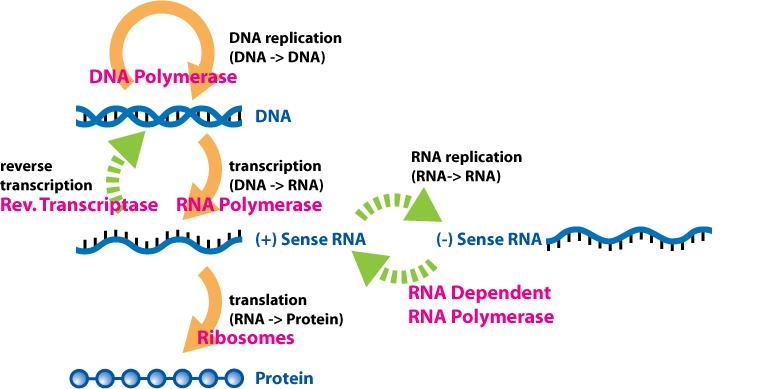
Differentiate between transcription and translation.
Answer
599.1k+ views
Hint: Transcription is the process of copying a gene's DNA sequence to make an RNA molecule and translation is the process in which proteins are synthesized after the process of transcription of DNA to RNA in the cell's nucleus.
Complete answer: The central dogma in molecular biology shows that DNA makes mRNA and mRNA make proteins.
DNA transcription → mRNA translation→Proteins
The process by which DNA forms mRNA is called transcription while the process by which mRNA forms protein is called translation.
Transcription occurs in the nucleus and translation in the cytoplasm. In the transcription process, the DNA first forms the heterogenous immature RNA (hnRNA), which comes out of the nucleus and matures into mRNA.
DNA transcripts genes which are responsible for synthesizing specific proteins.
Proteins are synthesized during the translation process which is actually carried out by means of tRNA and rRNA, thus the mRNA is not directly involved in the translation process.

Note: Both are biological processes and are concerned with DNA and RNA, both of them involve the processes of initiation, elongation, and termination.
Complete answer: The central dogma in molecular biology shows that DNA makes mRNA and mRNA make proteins.
DNA transcription → mRNA translation→Proteins
The process by which DNA forms mRNA is called transcription while the process by which mRNA forms protein is called translation.
Transcription occurs in the nucleus and translation in the cytoplasm. In the transcription process, the DNA first forms the heterogenous immature RNA (hnRNA), which comes out of the nucleus and matures into mRNA.
DNA transcripts genes which are responsible for synthesizing specific proteins.
Proteins are synthesized during the translation process which is actually carried out by means of tRNA and rRNA, thus the mRNA is not directly involved in the translation process.
| Transcription | Translation |
| It is the first step in Gene expression. | It is the second step in Gene expression. |
| Transcription synthesizes RNA copies from DNA | Translation synthesizes proteins from RNA copies. |
| Transcription takes place in the nucleus of the cell | Translation takes place in the cytoplasm of the cell |
| Transcription uses RNA polymerase enzyme to make copies of RNA from DNA | The translation uses Ribosomes to synthesize proteins from RNA transcripts. |
| It produces functional RNA (several copies) | It produces proteins |
| Here the only mRNA is involved | Here mRNA, tRNA, and rRNA are involved. |
| Transcription can be inhibited by antibiotic rifampicin | Translation can be inhibited by the antibiotic tetracycline |

Note: Both are biological processes and are concerned with DNA and RNA, both of them involve the processes of initiation, elongation, and termination.
Recently Updated Pages
Basicity of sulphurous acid and sulphuric acid are

Master Class 12 English: Engaging Questions & Answers for Success

Master Class 12 Social Science: Engaging Questions & Answers for Success

Master Class 12 Maths: Engaging Questions & Answers for Success

Master Class 12 Economics: Engaging Questions & Answers for Success

Master Class 12 Physics: Engaging Questions & Answers for Success

Trending doubts
Draw a labelled sketch of the human eye class 12 physics CBSE

Which are the Top 10 Largest Countries of the World?

Draw ray diagrams each showing i myopic eye and ii class 12 physics CBSE

Giving reasons state the signs positive or negative class 12 physics CBSE

Explain esterification reaction with the help of a class 12 chemistry CBSE

What is defined as a solenoid Depict a diagram with class 12 physics CBSE




